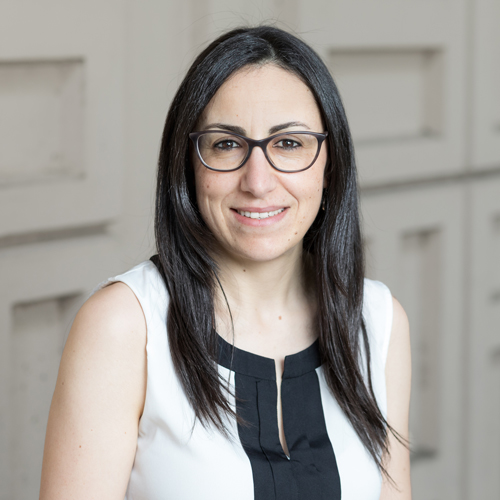Biography
Dr. Djaoud received her DVM degree at the Higher National Veterinary School of Algiers. After obtaining a Master’s degree in Immunology from Paris Descartes University and Paris-Est Créteil University, Dr. Djaoud completed a PhD in Human Immunology at the University of Nantes, with Dr. Christelle Retière. During her doctoral work, Dr. Djaoud studied the human immunity to cytomegalovirus (CMV). She then pursued her research, as a post-doctoral fellow and a research scientist, in the laboratory of Dr. Peter Parham at Stanford University, where she made several important findings on the human immunity to herpesviruses and cancer. Dr. Djaoud’s current research at the University of Ottawa and the CHEO Research Institute investigates how specific human immune cell populations can efficiently kill herpesvirus-infected cells and cancer cells.
Research interests
The Djaoud’s laboratory focuses on human innate lymphocytes and their diverse functional roles in viral infections, cancer and transplantation. The group is currently studying how herpesviruses and immunogenetics regulate innate immune cells through receptors for Human Leukocyte Antigen (HLA) class I, with a particular focus on γδ T cells and NK cells. Specifically, they study the effect of herpesviruses and polymorphisms in HLA and Killer cell Immunoglobulin-like Receptors (KIRs) on the repertoire formation of γδ T cells and other innate lymphocytes as well as their maturation and functional education. Their approaches combine functional immunology, T-cell receptor repertoire analysis and immunogenetics of HLA and KIRs. In order to study innate lymphocytes with ultra-resolution, the lab uses full spectrum flow cytometry, mass cytometry and high throughput gene sequencing.
Selected Publications:
- Walwyn-Brown K, Pugh JL, Alexander TH Cocker, Bayzaie N, Singer BB, Olive D, Guethlein LA, Parham P, Djaoud Z. Phosphoantigen-stimulated γδ T cells suppress natural killer cell responses to missing-self. Cancer Immunol Res. 2022 Mar 9; doi: 10.1158/2326-6066.CIR-21-0696.
- Djaoud Z and Parham P. HLA, TCR and KIR, the triumvirate of human cell-mediated immunity. Annu Rev Biochem. 2020 Jun 20;89:717-739. doi: 10.1146/annurev-biochem-011520-102754.
- Djaoud Z and Parham P. Dimorphism in the TCRγ chain repertoire defines two types of human immunity to Epstein-Barr virus. Blood Adv. 2020 Apr 14;4(7):1198-1205. doi: 10.1182/bloodadvances.2019001179.
- Djaoud Z, Guethlein LA, Horowitz A, Azzi T, Nemat-Gorgani N, Olive D, Nadal D, Norman PJ, Münz C, Parham P. Two alternate strategies for innate immunity to Epstein-Barr virus: One using NK cells and the other NK cells and γδ T cells. J Exp Med. 2017 Jun 5;214(6):1827-1841. doi: 10.1084/jem.20161017.
- Horowitz A, Djaoud Z, Nemat-Gorgani N, Blokhuis J, Hilton HG, Béziat V, Malmberg KJ, Norman PJ, Guethlein LA, Parham P. Class I HLA haplotypes form two schools that educate NK cells in different ways. Sci Immunol. 2016 Sep;1(3). pii: eaag1672. doi: 10.1126/sciimmunol.aag1672.
- Djaoud Z, Riou R, Gavlovsky P-J, Mehlal S, Bressollette C, Gérard N, Gagne K, Charreau B, Retière C. Cytomegalovirus-Infected Primary Endothelial Cells Trigger NKG2C+ Natural Killer Cells. J Innate Immun. Zakia Djaoud Curriculum Vitae, 3 2016;8(4):374-85. doi: 10.1159/000445320.
- David G, Djaoud Z, Willem C, Legrand N, Rettman P, Gagne K, Cesbron A, Retière C. Large spectrum of HLA-C recognition by KIR2DL2 and KIR2DL3 and restricted C1 specificity of KIR2DS2 : dominant impact of KIR2DL2/2DS2 on KIR2D NK cell repertoire formation. J Immunol. 2013 Nov 1;191(9):4778-88. doi: 10.4049/jimmunol.1301580.
- Djaoud Z, David G, Bressollette C, Willem C, Rettman P, Gagne K, Legrand N, Mehlal S, Cesbron A, Imbert-Marcille BM, Retière C. Amplified NKG2C+ NK Cells in Cytomegalovirus (CMV) Infection Preferentially Express Killer Cell Ig-like Receptor 2DL: Functional Impact in Controlling CMV-Infected Dendritic Cells. J Immunol. 2013 Sep 1;191(5):2708-16. doi: 10.4049/jimmunol.1301138.
